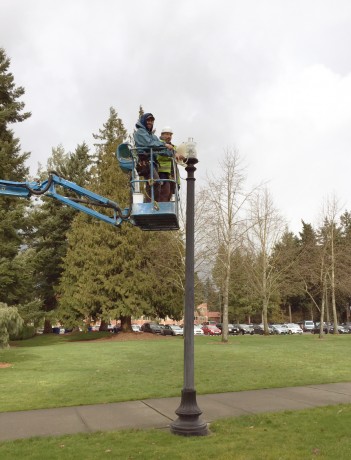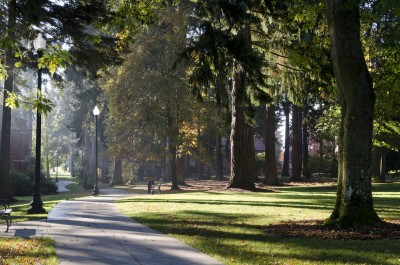First the campus grounds. Then the buildings. Then the power in the buildings. Now University of Puget Sound has gone “green” with the streetlights on campus, by installing low-energy, long-life LEDs throughout its grounds.
Facilities services staff expect the change to the campus’s 62 streetlights will save an estimated 63,400 kilowatt-hours each year—enough to power five homes. Streetlights within the campus were switched from 250-watt high-pressure sodium lamps to 54-watt LEDs. The project, completed in January on the 97-acre campus, is one of many steps Puget Sound has taken to run its operations in a sustainable and environmentally friendly way.
 |
|
LED streetlights being installed in University of Puget Sound. (Photos courtesy of University of Puget Sound) |
“This project is good for the environment and for the university’s bottom line,” said Bob Kief, associate vice president for facilities services. “The LEDS emit a bright white light that provides more visibility at night, so it also makes our outdoor spaces safer.”
Tacoma Public Utilities supported the retrofit through an energy-efficiency rebate that covers 70% of the cost. Puget Sound also will continue switching its indoor lighting to LEDs, as buildings and spaces are renovated. Last summer Marshall Hall, in Wheelock Student Center, was renovated and inefficient halide and halogen lamps were replaced with LEDs, reducing overall energy consumption by about 77%.
 |
|
Streetlights in University of Puget Sound located in Washington State, U.S. |
Over the years the national liberal arts college has pursued numerous sustainability projects, including energy and water management, growing hardy native plants, and planting trees as part of its partnership in the Tree USA program. Three new buildings achieved LEED Gold certification for the sustainable building practices used in their construction: Weyerhaeuser Hall, the Facilities Services complex, and the Live Green House student residence. Commencement Hall is certified as LEED Silver.
In 2010 the university decommissioned its central steam plant and installed individual boilers in 15 buildings. The new boilers increased average efficiency by about 85 percent. In addition, throughout campus there are ongoing efforts in recycling, purchasing of “green” products, encouraging energy-efficient transportation, waste and plastic-use reduction, student gardening of food, and other projects.
To learn more about sustainability and the Loggers Live Green initiative visit: pugetsound.edu/sustainability.
Press photos of the campus can be downloaded from pugetsound.edu/pressphotos.
Tweet this: One more step for #sustainability @univpugetsound Campus street lights now low-energy LEDs #loggerlivegreen http://bit.ly/1KvMJcN
Follow us on Twitter! twitter.com/univpugetsound





 CN
TW
EN
CN
TW
EN







